If you ask a physicist, “What are the primary colors?” They would ask you, “Are you talking about light or paint?” The answer is different for light and paint but beautifully connected.
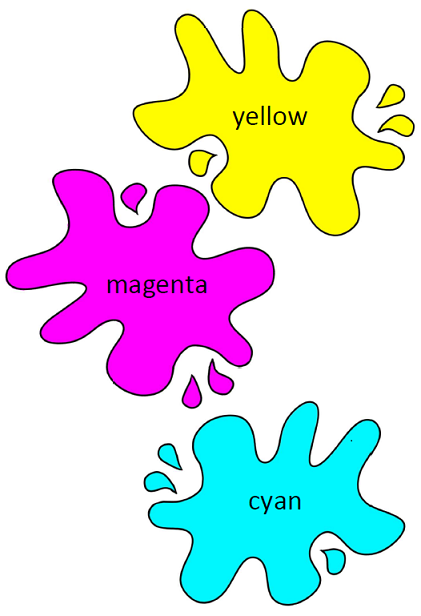
The REAL primary colors of paint are NOT red, yellow, and blue – as taught in school until you reach physics – but rather cyan, yellow, and magenta. You might recognize these as the colors of ink you buy (with black) to put into color printers and copiers.
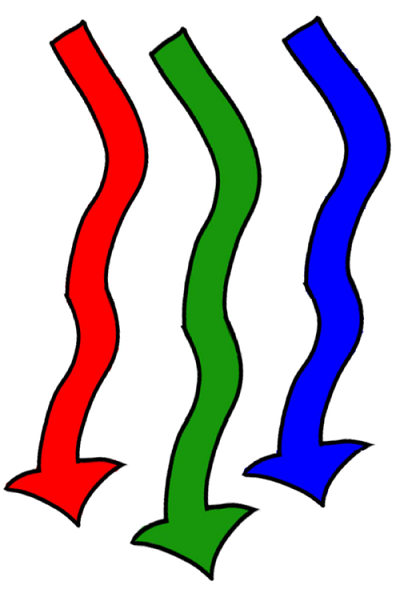
The REAL primary colors of light are red, green, and blue. If you could magnify the pixels on a white section of the screen you are currently looking at, you would see red, green, and blue lights which are creating the white color your brain sees. The cones in your eye, which detect color, are generally sensitive to red, green, and blue light. Did you notice the color of the floodlights at the Winterhaven Light Festival were red, green, and blue?
You can play with a PhET simulation called Color Vision to better understand how this works. Below is a screen shot from the simulation showing that when all three colors are on, red + green + blue, makes your eye see white.
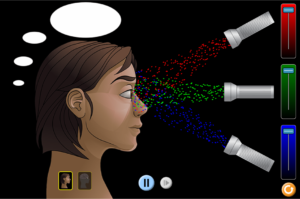
What color do you see if your eye is just stimulated by red and green light?
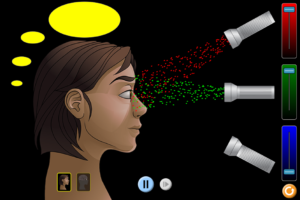
Red light + Green Light = ???
What color do you see if your eye is stimulated by green and blue light?
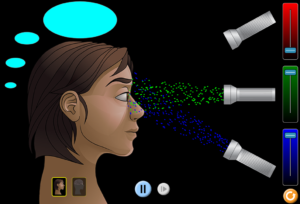
Green light + Blue light = ???
What color do you see if your eye is stimulated by red and blue light?
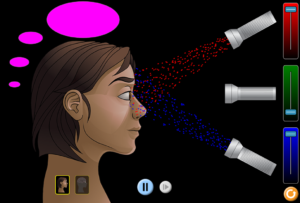
Red light + Blue light = ???
Did you notice the colored shadows from the harp (see picture below) when all three colored lights were on at the Winterhaven Light Festival? Do you see yellow, cyan, and magenta shadows???
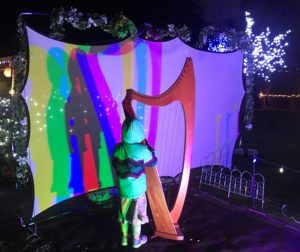
Look at this close up of the shadows of the harp made when all three floodlights (red, green, and blue) are shining on it. Where the harp blocks out the blue light, you get a yellow colored shadow when the red and green light fill it in. Where the harp blocks out the red light, you get a cyan colored shadow when the blue and green light fill it in. Where the harp blocks out the green light, you get a magenta colored shadow when the blue and red light fill it in. What other colors do you see in the image above? How do you think those are created?
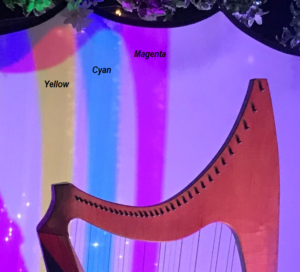
Color Addition with Light
Did you notice the secondary colors of light (colors created by mixing two of the primary colors of light) are cyan, yellow, and magenta? Did you notice the secondary colors of light (cyan, yellow, and magenta) are the primary colors of paint? Coincidence? I think not!
Color Subtraction with Paint
What do you think the secondary colors of paint (colors created by mixing two of the primary colors of paint together) are? Would you believe the secondary colors of paint are red, green, and blue? When you mix yellow and magenta paint together, you get red paint. When you mix cyan and magenta paint together, you get blue. When you mix cyan and yellow paint together, you get green.
Beautiful Connection When Taught Correctly
The primary colors of light are red, green, and blue. The secondary colors of light are cyan, yellow, and magenta.
The primary colors of paint are cyan, yellow, and magenta. The secondary colors of paint are red, green, and blue!
Don’t you just love the symmetry of the physics of color based on the biology of the human eye!








